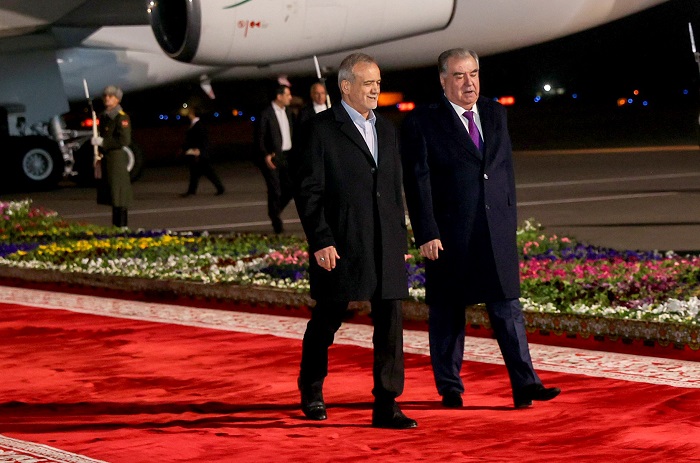From 15 to 17 January, Iranian President Masoud Pezeshkian was on a state visit to Tajikistan.
On January 16, Pezeshkian had summit talks with Tajik President Emomali Rahmon in Dushanbe, which resulted in the signing of 23 documents.
The signed memoranda and programs cover a wide range of areas, including cooperation between the Ministries of Foreign Affairs, Transport, Labor, Migration, industry, new technologies, education, healthcare, veterinary medicine, women and family, anti-corruption, digital technologies, statistics, standardization, information and communication technologies, customs, archival affairs, scientific research and exhibition activities.
The meetings and negotiations highlighted the shared history, cultural heritage, and civilizational bonds that exist between the two nations.
Iran and Tajikistan Pledge Deeper Economic Ties
Iran and Tajikistan expressed strong interest in deepening economic cooperation. This commitment was underscored by the holding of a Trade, Investment, and Tourism Forum, where 13 cooperation documents worth over $450 million were signed.
Discussions touched upon a wide range of sectors, including mineral processing, construction materials, food production, pharmaceuticals, energy, agriculture, and the utilization of Tajikistan’s free economic zones.
Iran’s significant transport and transit potential, particularly through the ports of Chabahar and Bandar Abbas, received special attention.
160 Iranian companies currently operate in Tajikistan, and in 2024, goods transportation volume surged 3.2 times compared to the previous two years.
Bilateral trade between Iran and Tajikistan flourished last year, exceeding $378 million, a significant increase of over 50%. However, direct investments remain modest at only $0.5 million, prompting both nations to recognize the need for concerted efforts to boost trade and attract greater investment.
The existing visa-free regime between the two countries is expected to significantly stimulate not only tourism but also business-to-business interactions.
Regional issues
During the negotiations, both countries discussed their positions on sensitive and conflict-related issues.
The Tajik side emphasized the crucial importance of security cooperation, given the current volatile global and regional security environment.
Regarding the Afghan situation, both sides underscored the need for joint coordination to provide essential humanitarian assistance to the Afghan people and to foster peace and stability in neighboring Afghanistan.
“We consider Afghanistan’s progress and stability as being in line with our interests. Preserving the security of borders is important for us,” the Iranian president said.
Addressing the tensions in the Middle East, President Rahmon expressed deep concern over the ongoing tragic situation in the Gaza Strip. He stressed the urgent need for the international community to take decisive action to end the instability in the region. In this regard, Tajikistan reiterated its unwavering support for the implementation of relevant UN resolutions on the Palestinian issue and emphasized the importance of upholding international law.
Pezeshkian also said that Tehran-Dushanbe relations can act as a platform to help resolve problems faced by the Islamic world and to address issues in countries like Afghanistan and Syria.
Signed documents
A joint statement was signed by President Emomali Rahmon of the Republic of Tajikistan and President Ebrahim Raisi of the Islamic Republic of Iran.
Other signed documents included:
• The program of cooperation between the Ministries of Foreign Affairs.
• A program of cooperation in the development of cargo transit through the port of Chabahar.
• Memorandum of Cooperation in the field of national and modern crafts.
• The action plan for cooperation in the field of industry and new technologies for the period 2025-2027.
• Memorandum of understanding between various universities and the Institute of Genetic Engineering and Biotechnology of Iran.
• A program of joint actions in the social sphere and protection of vulnerable groups.
• Memorandum between the Republican Blood Research Center of Tajikistan and the Iranian Blood Transfusion Organization;
• Memorandum of Cooperation in the field of animal health and veterinary medicine.
• Memorandum of Cooperation in the field of women and family.
• Memorandum of Cooperation in the field of anti-corruption.
• Memorandum of Cooperation in the field of innovation and digital technologies.
• Memorandum of Cooperation in the field of statistics.
• Memorandum of Cooperation in the field of standardization and metrology.
• Memorandum of Cooperation in the field of information and communication technologies.
• Memorandum on training between the Customs services.
• Memorandum of Cooperation in the field of archival affairs.
• Memorandum of Cooperation between the Center for Strategic Studies under the President of the Republic of Tajikistan and the Research Center of the Islamic Council of the Islamic Republic of Iran;
• Memorandum of Cooperation in the exhibition field.
• Memorandum of Cooperation in the field of Islamic studies. ///nCa, 17 January 2025
